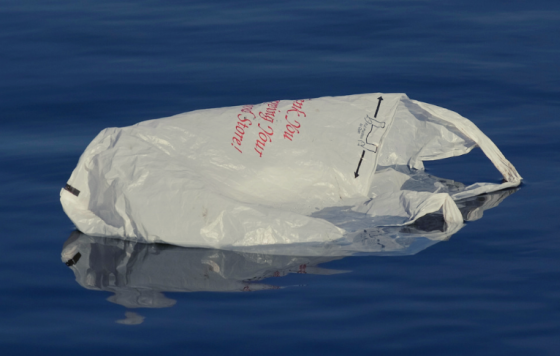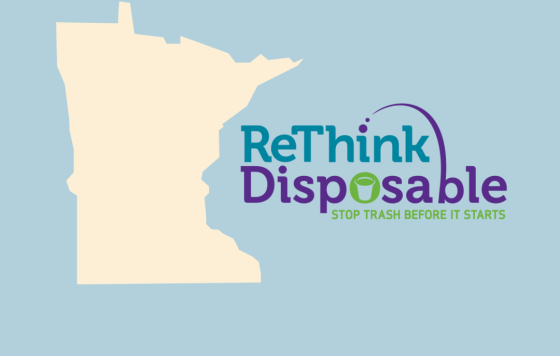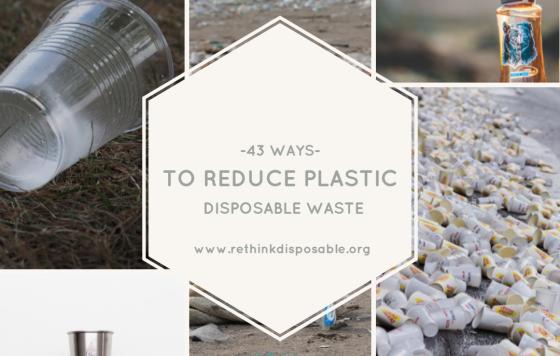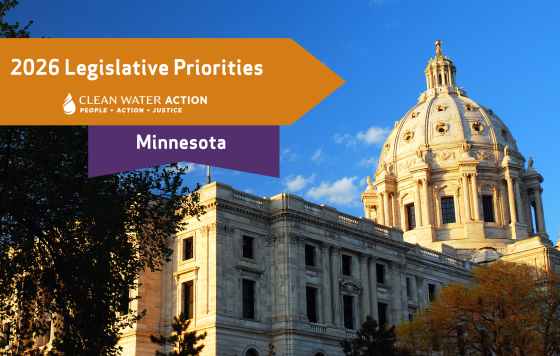In 2015, the Minneapolis City Council took steps to ban the use of plastic bags at grocery and retail stores in Minneapolis in an effort to reduce plastic pollution. Unfortunately, despite passage of the ordinance in 2016, the legislature took action in 2017 and passed language prohibiting cities from banning the use of plastic/disposable bags. Currently, Minneapolis and Duluth both charge a 5 cent fee for plastic bags within their city limits in an effort to encourage the use of reusable bags.
Local municipalities deserve the right to local control, especially when the decisions in question impact public health and safety and the water we drink. Clean Water Action is working to remove the plastic bag ban preemption in Minnesota statute, which will return local control around this issue back to where it belongs - with each city and town in Minnesota. Ending the plastic bag preemption will protect Minnesota waters, keep thousands of toxic chemicals out of our environment, save taxpayer dollars, and restore local control and autonomy. Send a message to your Minnesota state lawmakers today.
Preemption: a Microcosm of Federalism
On its surface, preemption makes sense: in some instances, it’s best for the state government to be responsible for something rather than a local government. That is an entirely fair and rational policy standpoint that I think we can all agree on. It wouldn’t make sense to allow Dakota county, for example, to have different water or wildlife regulations than its neighboring Scott county. However, that standpoint necessitates that in some other instances, it’s best for local government to be the responsible party. Which brings us to plastic.
More specifically, plastic bags. We all know the scourge of plastic bags, and lament the use of them but can’t deny the convenience. They’ve infiltrated our media: Katy Perry famously asked, “do you ever feel like a plastic bag, drifting through the wind, wanting to start again?”; an entire plotline in the 30 Rock episode is dedicated to Liz Lemon’s battle against a plastic bag stuck in the tree outside her window. They’ve infiltrated our meals, securing our food with their zipping and locking, sealed until the very moment you need it most. They satisfy a basic human desire to have a thing to hold other things: seemingly every culture in the world claims to be the first to have invented Plastic Bag Prime to hold all the other wadded-up plastic bags for some unknown future use. Plastic bags are the epitome of “ubiquitous.” It is to the point where not seeing plastic bags at a store is a shock, and mild panic sets in–what will I put my stuff in? I get it, believe me.
We’ve been told for decades to take individual steps to reduce our impact on the world around us, to be the change we wish to see in the world (conveniently ignoring the steps problematic industry could also take to “be the change.”) But there’s so much change in this world we all wish to see, and we all have a tolerance for how many personal changes we can make before we hit our wit’s end and give up and fall into a pit of existential dread.
For me, making the dedicated choice to at least make an effort to use a reusable bag was within my “change tolerance”. I already carry my messenger bag around with me wherever I go, I could just throw the reusable bag in there. When I realized the convenience of my messenger bag holding my reusable bag, I was elated. Success was guaranteed. I had done my part to solve the plastic crisis in the world–a true hero. Of course, when I first went to the store after stowing my reusable bag, I forgot it was in there and used several plastic bags for my groceries; only after getting home did I remember my reusable bag. I was no hero. I didn’t solve the plastic crisis. But my resolve was steadfast. I would conquer my forgetfulness and make it a habit to use my reusable bag. I can gladly report that after a few more trips to the store, it’s become second-nature to grab my reusable bag out of my messenger bag. [hold for applause]
That was my choice to make that change and hold myself accountable to it. A very minor change, especially in the grand scheme of things, but it’s the little victories that count. Taking a step down from my soapbox, let’s expand this concept to a larger scale: I had the (ethical) need and desire to switch to reusable bags, just like a city may have a need and desire to outright ban plastic bags within its borders. I didn’t have an external force stopping me from switching bags, but cities do. The state government expressly prohibits cities, towns, and counties from banning plastic bags1. The majority of the state legislature in 2017 believed that if there were to be a ban on plastic bags, it could only be done by the state government, and we’ve yet to have a legislature rebuke that belief (though there was an attempt2).
In fairness, this state preemption does theoretically provide stability and predictability for customers and state-wide businesses (insert your preferred “big-box” store here, Target for me): avoiding a “patchwork” of different regulations3. This preemption should also allow for some degree of additional standardization in manufacturing and waste management. Further, there’s evidence4 to show that if only used once, paper and reusable bags would be responsible for more carbon emissions than a plastic bag. The logic follows, then, that the emission-reduction efficacy of a ban is intrinsically tied to customer commitment to actually reuse reusable bags and not discard them prematurely.
I would contend that there is already a stable and predictable model in place for these retailers, as the vast majority (if not all) of them operate in California: the state poised to become the world’s fourth largest economy, with 30+ million people over the age of 18 (the well-known age you officially become a bag-user), and with a statewide plastic bag ban5 (albeit one that needs refining6). It doesn’t appear that California’s ban sank the big-box stores, nor the plastic bag industry. It would seem that simply allowing local governments to enact plastic bag bans in Minnesota – a smaller, less populous state, last I checked – wouldn’t cause feared instability and unpredictability. Further, I would agree with what Daniel Conway of the California Grocers Association said: “people are really starting to accept that they bring reusable bags with them when they go to the grocery store”6 rejecting those who say customers aren’t capable of the task. But maybe I’m wrong. Maybe local governments in Minnesota will be the ones to take down the vaunted behemoth of Big Retail with the one, simple trick of possible plastic bag bans.
Putting aside the sardonic tilt thus far, it is good governance for a locality to be responsible for a host of matters, including waste management practices within its jurisdiction. The minutiae, detail, implementation, and overall logistics of well-run waste management operations are far too granular for a state government to process on a daily, weekly, or even monthly basis. The needs of hyper-local neighborhoods or traditionally-ignored communities are more easily drowned out at the Capitol versus City Hall. This is the bedrock of our nation, the fundamental push-and-pull of Federalism: where does the responsibility and authority of the state government end? Where does the responsibility and authority of the local government begin? What happens when the governments inevitably overlap? Is the trope true, the detached FBI agent stealing the case from our protagonist, Handsome Local Detective?
It is my assertion that Federalism is clear in this context: local control must be restored to combat the environmental degradation caused by single-use plastics. We should continue to debate and discuss the evolution of Federalism, and the merit of various plastic usage in our daily lives. But we really don’t need to continue the debate about plastic bags. We know they’re bad. We know they take forever and a year to break down7. We know they leach toxic chemicals into our soil and water as they sit in landfills8. And we know that if we want to vote to enact a plastic bag ban in our municipality, we should be allowed to do so. That is how democracy works9.
Quoting Jack Donaghy in the aforementioned 30 Rock episode, the plastic bag in a tree says to Liz Lemon, “no human is the master of his fate.” I disagree. Collectively, we can influence the future. We can create better systems and things. We can invent and innovate solutions to modern problems, finally achieving the Holy Grail of a bag to hold multiple bags that hold other bags. But we have to commit to that change. We can’t forget the reusable bag in our messenger bag, and we can’t handcuff our ability to prevent toxic chemicals from getting into the creeks and streams in our neighborhoods.
As I see it, we have two potential solutions, and we’ve been handed a different, false solution:
- Potential solution #1 is the state government acts on the authority it asserts to have and enacts a statewide plastic bag ban. This will assuage concerns of an unstable and unpredictable environment for customers and businesses, allow for further industry divestment from plastic bags, and achieve pro-environment policy. Problem solved.
- Potential solution #2 is the state government repeals this preemption and allows local control for plastic and other packaging regulation. There is no cause for concern due to instability or unpredictability because there is no requirement to enact a ban. This gives the flexibility and ability to quickly respond to needs to the level of government literally created to handle those things. If a ban is enacted, that is a pro-environment policy. Problem solved.
What is not an option, is the false solution of the status quo. The state government being responsible for something makes sense in some instances, but not in this instance. Flat out prohibiting the citizenry of our state from voting to enact a plastic bag ban in our community is rejecting the modernization in retail operations, an endorsement of water and soil pollution, an affront to the fundamental principles of our American voting rights, and insultingly paternalistic. We live here, we know what’s best for our communities. We need to be able to take care of it, and ending this plastic bag ban preemption will allow us to do so.
1. Minnesota Statutes § 471.9998 (2017). https://www.revisor.mn.gov/laws/2017/0/94/#laws.8.14.0
2. SF 1903, 91st Legislature (2019-2020). https://www.revisor.mn.gov/bills/bill.php?f=SF1903&b=senate&y=2019&ssn=0
3. Avise, J. (2019, March 12). Local government panel OKs bill to reverse prohibition on local plastic bag bans. Session Daily. https://www.house.mn.gov/SessionDaily/Story/13749
4. Tuomi, Hannah, "Paper or Plastic? A Comparison of the Carbon Emissions of Grocery Bags" (2017). Undergraduate Research Symposium 2017. https://digitalcommons.morris.umn.edu/urs_2017/2
5. California Department of Resources Recycling and Recovery (CalRecycle). (n.d.). Carryout bags. https://calrecycle.ca.gov/Plastics/CarryOutBags
6. Tabuchi, H. (2024, February 15). California tried to ban plastic grocery bags. It didn’t work. New York Times. https://www.nytimes.com/2024/02/15/climate/california-plastic-bag-ban.html
7. United Nations Environment Programme. (n.d.). Visual feature | Beat plastic pollution. U.N. Environment Programme. https://www.unep.org/interactives/beat-plastic-pollution/
8. United Nations Environment Programme. (2021, December 22). Plastic planet: How tiny plastic particles are polluting our soil. U.N. Environment Programme. https://www.unep.org/news-and-stories/story/plastic-planet-how-tiny-plastic-particles-are-polluting-our-soil
9. Minnesota Secretary of State. (n.d.). Register to vote. Retrieved February 13, 2024, from https://www.sos.state.mn.us/elections-voting/register-to-vote/





